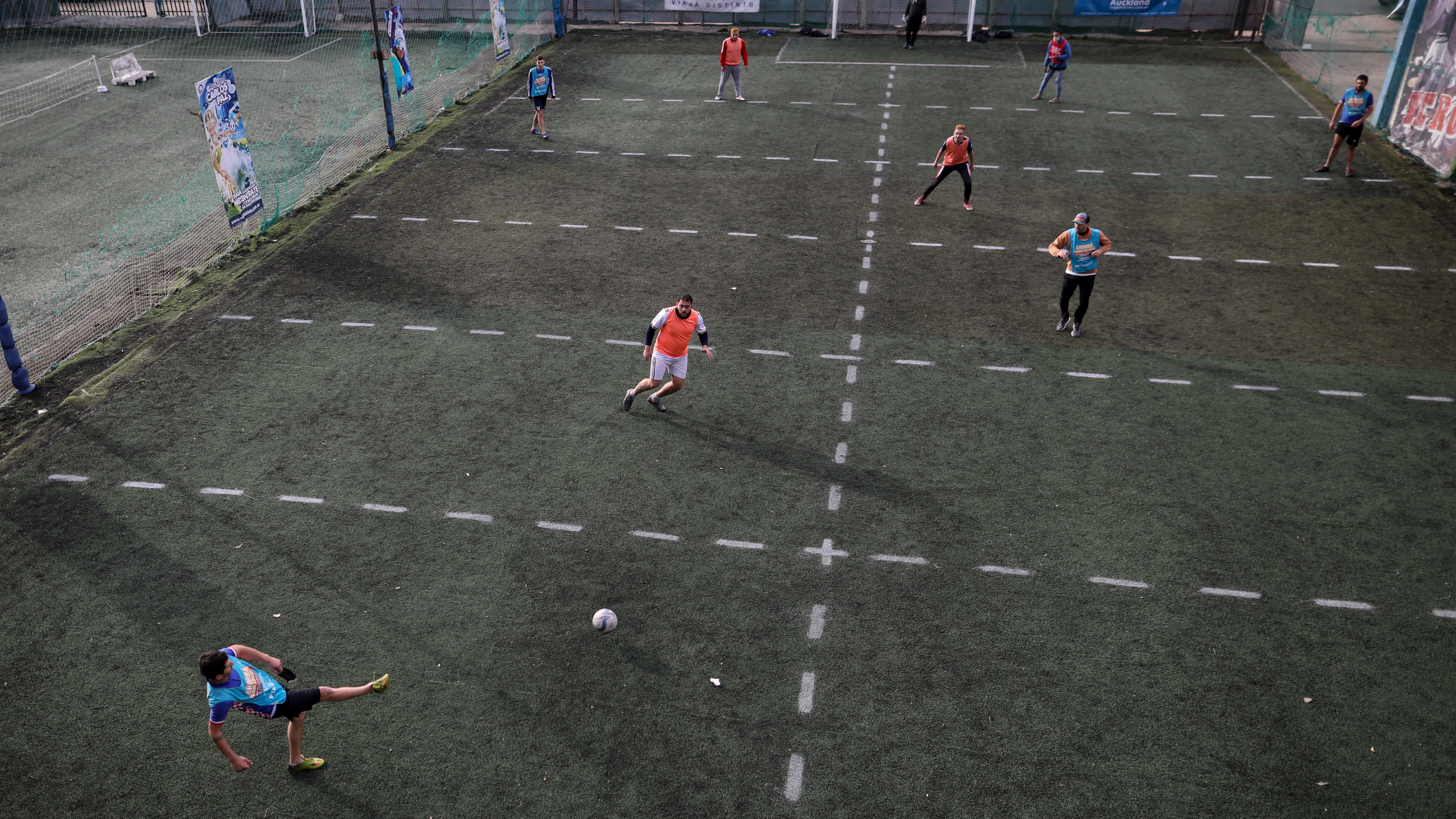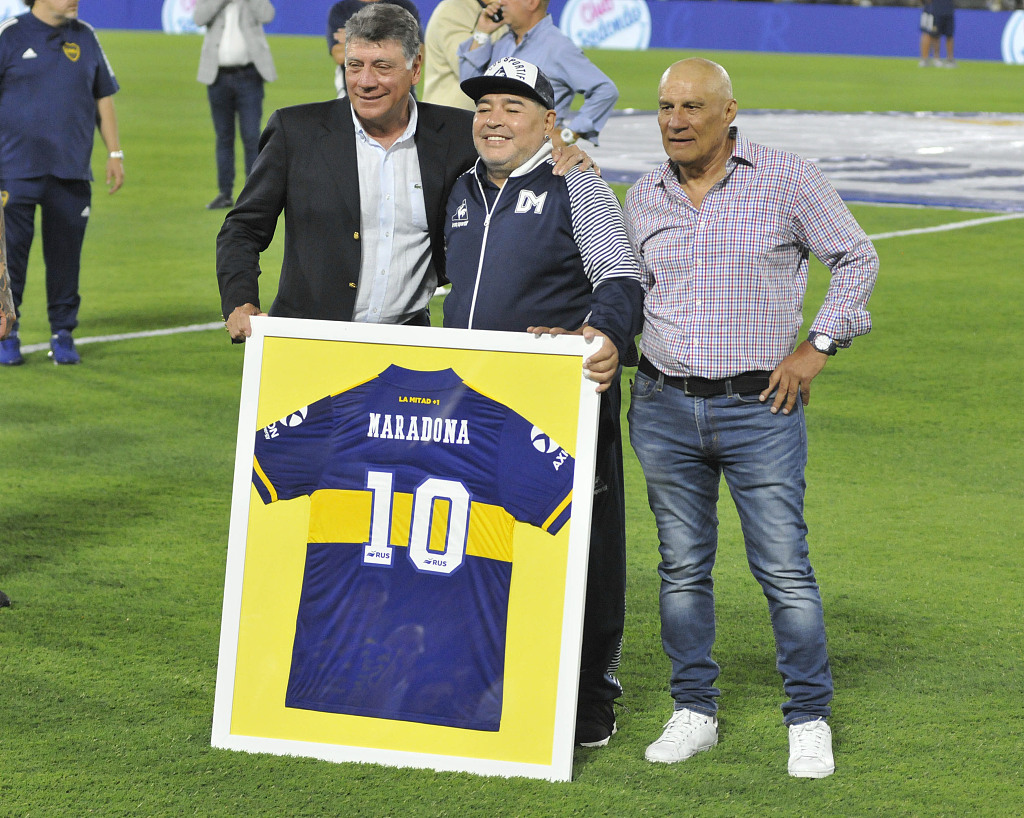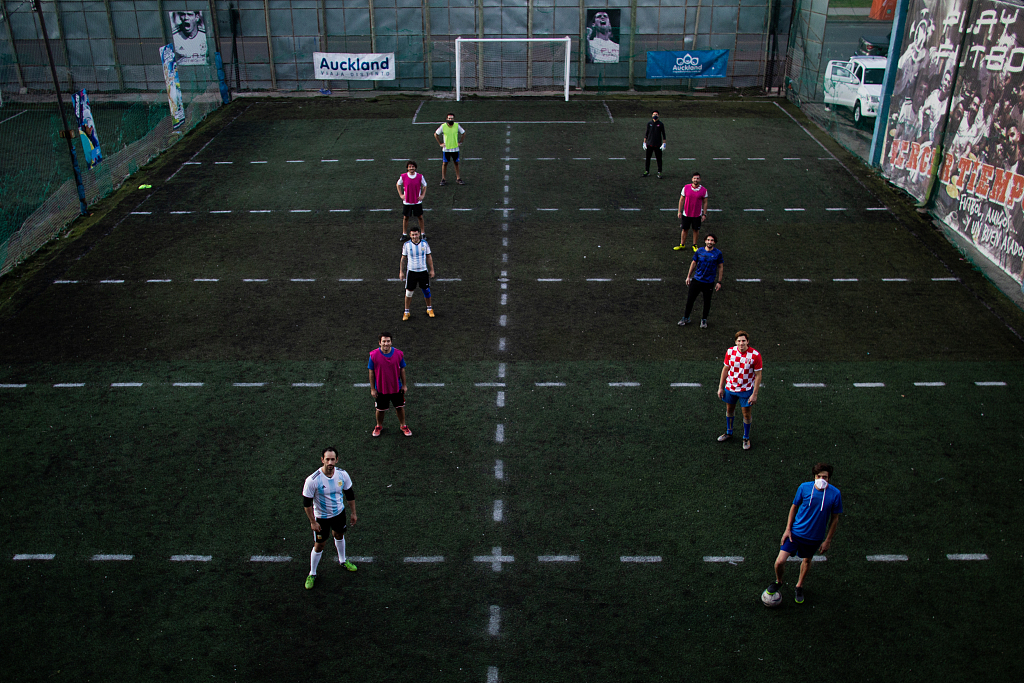
In order to continue playing amid government restrictions to curb the spread of the COVID-19, footballer play the new "human football" at the field that has been divided into 12 rectangles to mark limited areas for each player, keeping them from making physical contact, in Pergamino, Argentina, July 1, 2020. /AP
In order to continue playing amid government restrictions to curb the spread of the COVID-19, footballer play the new "human football" at the field that has been divided into 12 rectangles to mark limited areas for each player, keeping them from making physical contact, in Pergamino, Argentina, July 1, 2020. /AP
Football-starved Argentines have found a way to play their beloved sport while social distancing, though the rules have been altered and the dazzling end-to-end dashes produced by national legend Diego Maradona are impossible.
Dubbed “metegol humano," or "human foosball," the system designed for the coronavirus pandemic involves dividing the field with white chalk into 12 rectangles and restricting each player to a defined space. The ball can be passed across rectangles, and players can dribble inside their areas. The modified game emphasizes passing and shooting over running and fancy footwork. And, of course, there are no rough tackles.
Members of the Vende Humo FC and Los Mismos de Siempre amateur teams tried the new form of football at the Play Fútbol 5 sports complex in the city of Pergamino, about 240 kilometers from the capital of Buenos Aires. Players concentrated Wednesday on not stepping over the lines as they dribbled and defended. Leaving one’s rectangle incurs a penalty.
They agreed it was great to be playing again after a 100-day drought. Professional football in the country is suspended, and players cannot train. For amateurs who usually rent fields for games, it was like breathing again.

Diego Maradona (C) receives a plaque displaying his iconic No. 10 jersey, from his friends Miguel Angel Brindisi (L) and Hugo Osmar Perotti (R), prior to a football match in Buenos Aires, March 7, 2020. Maradona, Brindisi and Perotti formed an unforgettable trident in the honorary title from the Boca club in 1981. /VCG
Diego Maradona (C) receives a plaque displaying his iconic No. 10 jersey, from his friends Miguel Angel Brindisi (L) and Hugo Osmar Perotti (R), prior to a football match in Buenos Aires, March 7, 2020. Maradona, Brindisi and Perotti formed an unforgettable trident in the honorary title from the Boca club in 1981. /VCG
"Now I feel free and happy, getting together again with friends and playing football," said Martín Rodríguez, a defender from Vende Humo FC. "If it were up to me, I would do this from Monday to Monday."
A week ago, Pergamino became the first place to test the new game, which has just five players on each team, instead of the traditional 11. That allows games to be played within the framework of Argentina's quarantine, which allows outdoor activities with up to 10 people.
Rodríguez said he is adapting to the changes. "It is about paying attention and keeping the distance the game allows us. We have to know how far we can go. We cannot go over the line," he explained.
Players acknowledge that some of the magic is missing, particularly the game’s friction, the "in the ear" trash talk and the kicks followed by apologies. But the point of the new system is to keep a distance.
Gustavo Ciuffo, owner of the Play Fútbol 5 complex, devised the new game, which has been replicated in recent days in other parts of Argentina, a football-mad nation that produced Barcelona megastar Lionel Messi as well as Maradona.
Ciuffo took advantage of Pergamino's low infection rate, which let the city enter a looser phase of the quarantine imposed on March 20. Authorities in Pergamino authorized the sport on Friday, and a game started the next day. In other parts of the country with limited circulation of the virus, sports activities have also gradually returned, but not in Buenos Aires, which has been a hot spot for infections.

As quarantine has been extended until July 17 in Argentina, some cities have eased restrictions and group sports are permitted keeping social distance. A group of footballers resume the sport in a field with lines marked to keep distance in Pergamino, Argentina, June 27, 2020. /VCG
As quarantine has been extended until July 17 in Argentina, some cities have eased restrictions and group sports are permitted keeping social distance. A group of footballers resume the sport in a field with lines marked to keep distance in Pergamino, Argentina, June 27, 2020. /VCG
Ciuffo said he was happy to have found a solution "at a very hard time," when the lock-down exacerbated the country's economic crisis and demoralized so many Argentines. Getting the ball rolling again was the best antidote to depression, he said.
Before each game, players must clean their shoes and hands and sign an affidavit on the state of their health. Once on the field, they can play without a mask.
If a team fields a single defender, the player can move in two adjacent rectangles. But if the team “is more conservative” and has two defenders, each one must stay inside his or her rectangle. In the absence of contact and with limited space, the game is more continuous, intense and requires a precise shot, Ciuffo said.
Goaltender Leonardo Vanney chooses not to focus on the limitations.
The "great joy" of getting together with his teammates and competing in a tournament is what is important to him, he said.
Source(s): AP